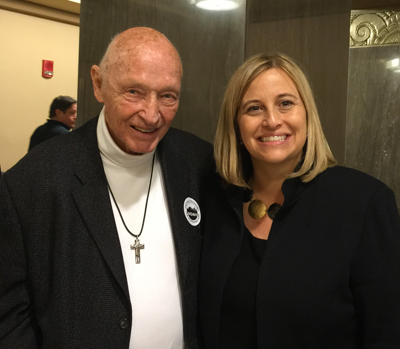
The Rev. Bill Barnes stands with Mayor Megan Barry after endorsing her mayoral campaign in 2015.
Long before the recent cries of an affordable housing crisis in Nashville, the Rev. Bill Barnes was concerned about how Nashville's growth would affect people living in poverty and homelessness.
Barnes, who died Monday at the age of 86, had worked on affordable housing issues in the city since the '60s and was the founder of Nashville's first intentionally desegregated church congregation at Edgehill United Methodist Church.
Former Mayor Karl Dean named the city's first fund for affordable housing after Barnes in 2013 — the Barnes Housing Trust Fund — and it received its largest injection of funds from Mayor Megan Barry in 2016's Metro budget.
Barry co-sponsored the legislation that created the the fund in 2013 when she was an at-large Metro Council member.
"The Rev. Bill Barnes was the conscience of our city for decades," Barry said in a statement. "He consistently and faithfully gave voice to the voiceless, speaking up for the unhoused, for those who need affordable places to live and for the needs of the Edgehill community. I’ll miss his thoughtful counsel, and all of Nashville will miss his spirit of service, advocacy and activism. But we know that Rev. Barnes taught generations of leaders who will follow in his footsteps in the years to come. That’s a beautiful legacy."
In an interview with the Nashville Civic Design Center, Barnes said starting the congregation at Edgehill in 1966 was an opportune experience for the time, because the neighborhood was in a period of renewal and development that would affect the city "for generations to come."
“Well, Edgehill was pretty much an entirely black community at the time," Barnes said. "We began the church in 1966, the summer, there were 15 of us. We really wanted to be part of an interracial congregation that was not only interracial in its makeup but firmly committed to the health of the neighborhood. We kept talking about continuing a love affair with the neighborhood."
In the same interview, Barnes said he connected affordable-housing issues to urban renewal efforts and made note that some housing efforts in the '60s did more to further segregation than to stop it.
"It probably was not a coincidence that the line for urban renewal was the alleyway between Villa [Place] and 16th Avenue, because at 16th you had Music Row," Barnes said. "So black folks got redistributed and shuffled around and monochromatized. ... The relationship at that time between urban development and race was very clear."
Judith Tackett, director of the Metro Homelessness Commission, first met Barnes when she was a reporter writing about affordable housing in Nashville. He had invited her to his home for the interview, and he sat in his office surrounded by “walls and walls of books,” she says.
“His door was always open to people like me who were seeking his advice. He never preached to me, but listened. And through his listening and a few well-placed questions, he taught me that ending homelessness is about more than putting a person into housing. It is about building community, engaging people, dignity and the heart of a city where people still care about each other.”
Barnes said creating affordable housing and advocacy for people in poverty was a way to buoy struggling families and bring community to the city.
“There was no question that in my mind that to be Christian in the world is to struggle to help the weak links for the sake of the strength of the whole chain," Barnes said. "Not the weak links to the exclusion of the other, but if the other links really knew, they too would be as concerned about the weak links.”
Belmont United Methodist Church plans to host a memorial service for Barnes at 11 a.m. Sept. 2.





